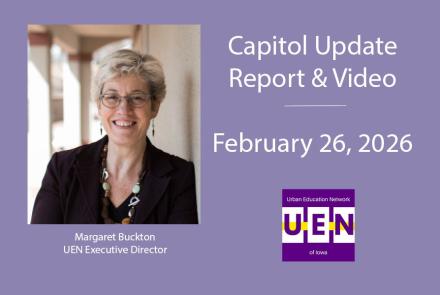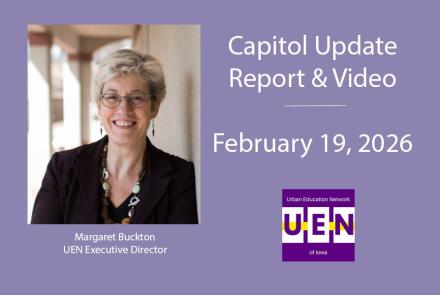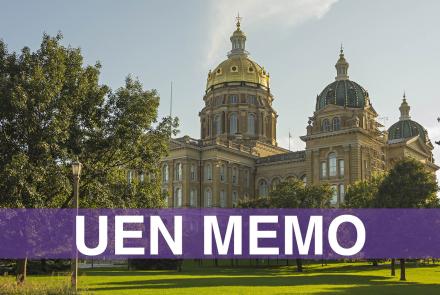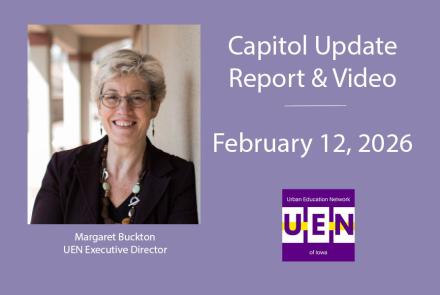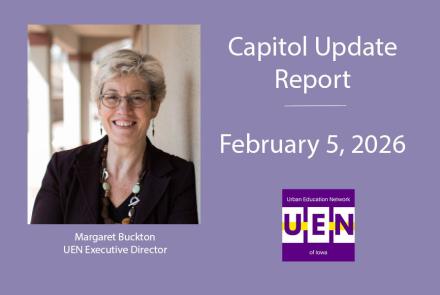Capitol Update - January 21, 2021
UEN Legislative Update
January 21, 2021
In this UEN Report of the second week of the 2021 Legislative Session, find information about:
- School Choice Discussion Begins
- Diversity Plan Subcommittee in the House
- Governor’s In-Person Parent Option Bill Introduced in the Senate
- Governor’s School Choice Omnibus Bill Introduced in the Senate
- PK/COVID Budget Challenges
- SSA/State Foundation Aid Timeline and Talking Points
- Senate and House Education Committee Members
- Finding Biographical and Contact Information for your Legislators
- Advocacy Resources
Download the Full January 21, 2021 Capital Update Report
School Choice Discussions Begin: Check the UEN web site for a Call to Action which will be posted soon at https://www.uen-ia.org/blogs-list
Bans Diversity Plan Open Enrollment Regulation: A subcommittee was held in the Iowa House on HSB 64 Voluntary Diversity Plans. The bill bans the ability of five districts with voluntary diversity plans (Davenport, Des Moines, Postville, Waterloo and West Liberty) from regulating open enrollment out of the district based on their plans, which currently review socioeconomic status (income) or English-language learner classification as metrics to consider. (None of these districts uses race as a metric, which was banned as a sole measure of consideration by a Supreme Court decision in 2007.) The bill retains Iowa Code language in the section that allows regulation of open enrollment by districts with court-ordered desegregation plans.
The goals of the diversity plans are to preserve a mix of diversity and prevent segregation of schools in these districts. There is a solid research base that shows a concentration of poverty which hits a tipping point at 50-60% and segregated schools negatively impacts student achievement, economic growth and workforce diversity for such communities. See the UEN Issue Brief explaining the issue and showing data on poverty, minority, open enrollment and certified enrollment for these districts and for similar districts without voluntary diversity plans. This Brief was shared with subcommittee members in the House and posted to the comments section of the legislative website.
The Subcommittee of Reps. Hite, Wills and R. Smith approved the bill to move forward to the full House Education Committee on a vote of 2:1. The bill could be on the Committee agenda as early as Monday. UEN is opposed to the bill. House Education Committee members and email addresses are found here: https://www.legis.iowa.gov/committees/committee?ga=89&groupID=686
In-Person Instruction Parent Option: SSB 1064 was introduced Wednesday and assigned the subcommittee of Sens. Zaun, Goodwin and Quirmbach. In the Governor’s Condition of the State speech, Reynolds asked the legislature to send her this bill immediately so she could sign it.
The bill requires schools to offer parents an option for in-person instruction five days a week beginning no later than the second Monday following the effective date of this Act. The bill requires schools offer parents the ability to select full time in-person instruction for their student unless this requirement is explicitly waived for one or more school districts or accredited nonpublic schools in a Governor’s Public Health Disaster Emergency proclamation. The bill requires schools not already offering the full-time option on the effective date of this act to provide parents notice of the opportunity to select full-time in-person instruction and allow the parent at least 5 days to decide their selection if the school will still offer other instructional options. The bill specifics that instructional hours held virtually or via hybrid learning only count if provided in compliance with this law, 2020 legislation, or under the Governor’s proclamation related to COVID-19.
The bill also specifies additional factors that the DE shall consider in granting an exception to allow primarily remote learning, in addition to the 15% positivity rate in the county and student absences, to include the number of teachers in COVID-19 quarantine as well as a scarcity of bus drivers and substitute teachers. We hear there may be an amendment to this section and will keep you posted. The bill is effective on enactment (once signed by the Governor.) UEN is registered as undecided on the bill, opposed to the mandate for parent option but supportive of the additional criteria upon which to grant waiver for 100% remote learning.
In discussing this policy with legislators, please reiterate these points:
- All school leaders and educators want students back in school full time!
- Staff capacity to safely provide in-person instruction and virtual learning for those parents who have already chosen that option varies by school district.
- Consider a phase-in cycle of allowing elementary school in-person instruction first, middle school second and high school last (based on the ability to provide adequate social distancing in schools and complexity of assigning staff and students to sections in larger high schools.)
- In order to balance the interests of safety and student learning, request an effective date for each school that is triggered by staff offered the opportunity to complete the COVID-19 vaccination cycle.
- A mandated parent option may tie the hands of the school board in reacting to an outbreak of COVID actually requiring the temporary closure of a building, potentially increasing requests to the DE for 100% virtual learning, as the pandemic continues over the next 2-3 months, at least until staff are vaccinated.
- More students and staff in densely populated buildings increases the potential for transfer of the virus and increases the burden on additional contact tracing and subsequent quarantine.
- Local school boards, in consultation with their county public health officials, are in the best position to guide a safe return to school.
Governor’s Omnibus School Choice Bill: SSB 1065 was introduced Wednesday and assigned the subcommittee of Sens. Sinclair, Zaun and Quirmbach. The bill includes the other 7 provisions of school choice that were mentioned in her Condition of the state and a few others, including;
- Student First Scholarship Program (vouchers) for resident students in public schools identified for comprehensive support and improvement;
- Charter Schools chartered by school boards or other entities independent of the school board;
- Elimination of Voluntary Diversity Plan district authority to regulate open enrollment out of the district;
- Education Information, Program Standards and Funding section includes mandatory district use of state selected student information system and fee to schools to use it,
- New Flexible Student and School Support program and new funding flexibility;
- Expands educator tax credits and tuition and textbook tax credits;
- Adds an April 1 second count date for student enrollment;
- Open enrollment changes with additional good cause, allows receiving district to enter sending district to bus students without the consent of the resident district, and eliminates 90 waiting period for extracurricular eligibility;
- School Board powers and duties.
UEN is opposed to this bill except for the Flexible Student and School Support Program section. A detailed summary of the entire bill can be found here and posted on the UEN Website at https://www.uen-ia.org/capitol-update-january-21-2021
Talking Points on School Choice: Vouchers are Wrong for Iowa:
- Student First Scholarships are the wrong public policy for Iowa and an inappropriate use of public tax dollars.
- Parents should have the choice to enroll their child in a private or religious school, but not with public taxpayer funds.
- Use public dollars for public schools, period. The public’s investment should be used to support public community schools which are open to all students regardless of race, religion, gender, socio-economic states and disability, not for the new entitled program for parents who choose private education.
- Public funds require public accountability and transparency. Public Schools are overseen by a publicly elected citizen governing board, are required to report academic results to the general public, have an annual public financial audit, and are transparent with all expenditures and decision-making. Private and religious schools are not held to that same public standard. Taxpayers have a right to know how their funds are being used, but are left in the dark about the use and impact of voucher funds.
- A slippery slope toward a costly and expansive voucher program: This voucher program may start small, but as we’ve seen in other states, once a program is established, it is easy to expand. This will pull more resources away from public schools.
See IASB Maps of Private Schools in Iowa and Map of Voucher Eligible School Buildings:
Map of Private Schools in Iowa: This map shows where private schools are located in Iowa and which legislative district they are in. Show your legislators that rural students will not benefit from a voucher program and public schools are their best and only choice.
Map of Voucher Eligible School Buildings: This map shows where school buildings are identified in need of comprehensive support and improvement under the federal Every Student Succeeds Act (ESSA), making their students eligible for the voucher program in Iowa. The map compares where those schools are located to the location of private schools that a voucher could be used to attend.
PK/COVID Budget Challenges
Enrollments in 4-year-old Preschool last Oct. 1, 2020, were down 4,076 students, of which 1,942 were in UEN districts. There is no budget guarantee or on-time funding protection for PK enrollment changes. When talking with your legislators about funding, let them know that preschool budgets statewide will be down $14.4 million in the fall of 2021 if they don’t address the problem.
Additionally, kindergarten, also not compulsory in Iowa, made up 2,086 of the total 5,935 statewide enrollment drop. Next year’s kindergarten class is likely to be abnormally large. HF 14 PK For Iowa’s Young Children would allow young 5-year olds to be served in preschool and generate funding through the enrollment count in the subsequent year for a three-year pilot project. UEN has registered as undecided on this bill since it doesn’t contain funding for the return of an anticipated 4,000 4-year-olds to schools next August.
SSA School Funding
UEN is advocating for the legislature to appropriate $95-100 million for school funding this year, as they have typically done over the last decade plus. Due to the drop in enrollment statewide of 5,935 last fall, next year’s budget costs the state less to adequately fund a reasonable increase. The $95-100 million could fund an increase of 3.9-4.0% in the state cost per pupil. Given how hard educators and all school staff have been working through this difficult year, and because it is affordable to the state, we encourage the legislature to reach this funding goal for FY 2022. As an added bonus for taxpayers, higher SSA reduces budget guarantee property taxes. At the Governor’s 2.5% recommendation, 137 districts are eligible for Budget Guarantee, costing local property taxpayers $25.9 million statewide (and only costing the state $20.1 million). The 4.0% SSA places 76 districts on the Budget Guarantee, at only $7.3 million paid by local property taxes. That is actually less than the current year’s $8.3 million Budget Guarantee.
Check out the difference for your district with the ISFIS New Authority Calculator tool. Share this impact with your legislators. The SSA clock is ticking. Iowa Code requires the Legislature and Governor to set the SSA rate within 30 days of the release of the Governor’s budget, which is by Feb. 12, 2021.
Senate and House Education Committee Members
The following links will take you to each committee member’s legislative page, with email address and often home or cell phone number so you can easily connect with them. The Governor’s School Choice and in-person learning bills will be in the Senate Education Committee on Monday. The Diversity Plan bill will be in the House Education Committee as early as Monday.
Senate Members
|
House Members
|
Connecting with Legislators: Find biographical information about legislators gleaned from their election web sites on the ISFIS site here: http://www.iowaschoolfinance.com/legislative_bios Learn about your new representatives and senators or find out something you don’t know about incumbents.
Find out who your legislators are through the interactive map or address search posted on the Legislative Website here: https://www.legis.iowa.gov/legislators/find
To call and leave a message at the Statehouse during the legislative session, the House switchboard operator number is 515.281.3221 and the Senate switchboard operator number is 515.281.3371. You can ask if they are available or leave a message for them to call you back.
Advocacy Resources: UEN just launched a new website. More tools and resources will be added, but go to www.uen-ia.org to find Advocacy Resources such as Issue Briefs, UEN Weekly Legislative Reports and video updates, UEN Calls to Action when immediate advocacy action is required, testimony presented to the State Board of Education, the DE or any legislative committee or public hearing, and links to fiscal information that may inform your work. The latest legislative actions from the capitol will be posted at: www.uen-ia.org/blogs-list. Check out the new UEN Advocacy Handbook linked here, and also available from the subscriber section of the UEN website
Thanks to our UEN Corporate Sponsors: Special thank you to your UEN Corporate Sponsors for their support of UEN programs and services. You can find information about how these organizations may help your district on the Corporate Sponsor page of the UEN website at https://www.uen-ia.org/uen-sponsors.
|
|
Contact us with any questions, feedback or suggestions to better prepare your advocacy work:
Margaret Buckton
UEN Executive Director/Legislative Analyst
margaret@iowaschoolfinance.com
515.201.3755 Cell
- Log in to post comments



